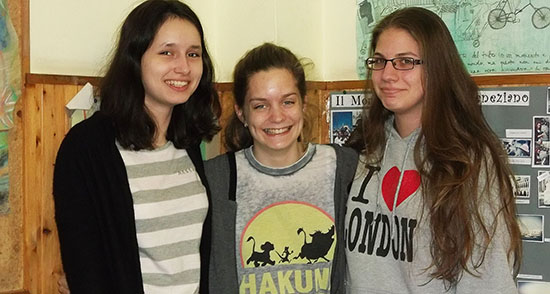Hungarian Students Write About Testimony in Art and Writing Contest


(Left to right: Luca Szöllősi, Csenge Gábeli and Anna Breczku)
When ninth grader Csenge Gábeli started watching her first-ever clip of testimony from the Visual History Archive, she wasn’t immediately drawn in, she admits. She didn’t quite understand it and didn’t feel a strong connection to the survivor. So she tried another – a woman named Paula Lebovics who looked “truly nice and pretty” and who Gábeli thought must have had an interesting life.
“I was totally right!” Gábeli said. “I couldn’t stop watching the interview, she is amazing, brave and she was just a little girl when all these appalling events happened to her. I could understand her and I felt for her so much while looking at her through an interview.”
Gábeli was watching testimony on the USC Shoah Foundation website at her school, Berzsenyi Dániel Gimnázium, in Budapest, Hungary, in order to participate in a contest organized by Andrea Szőnyi, USC Shoah Foundation’s international training consultant based in Hungary. Szőnyi invited teachers to use testimonies from the Visual History Archive in their classrooms and participate in the contest with their classes; students were instructed to watch testimony clips in Hungarian, English or other languages and make an art project (drawing, installation, photo, etc.) or a literature project (short story, poem, etc.).
Szőnyi received over 140 submissions. She is currently reviewing the work and seeing if Ludwig Museum (the Museum of Contemporary Art) in Budapest can host an event for all the participants.
Gábeli’s teacher is Anita Klein, a graduate of USC Shoah Foundation’s iTeach professional development program held at Berzsenyi Dániel Gimnázium, which is a USC Shoah Foundation Partner School. Gábeli and two other classmates in Klein’s ninth grade English class – Luca Szöllősi and Anna Breczku – entered the contest.
Gábeli wrote a short story inspired by Lebovics’ testimony and the police’s brutal, shocking actions against her.
Luca Szöllősi wrote a story about survivor Clare Winter’s separation from her family at Auschwitz. Szöllősi said she was inspired by her own visit to Auschwitz last year and the vivid stories survivors tell in their testimonies about their struggles to survive. It showed her that they experienced things so horrible that they can never forget them.
“I want the readers to realize the horror of the Holocaust and I want to affect their feelings because this is a topic that will not fade away, and we should focus a bit on this event – as awful as it is,” she said.
Anna Breczku said her great-grandfather was killed during World War II, so she grew up hearing about his experiences. She was especially interested to watch testimonies about “love during the Holocaust,” “camps” and “hiding,” and was impressed that the survivors could tell their stories so courageously. For the contest, she wrote a poem inspired by the testimony of Erna Anolik.
The last two lines of her poem are:
‘We are free with this never ending dream.
Make the world peaceful so we can be who we are meant to be.’
“I wrote this not just because it rhymed. I wrote it because I want others to accept Jewish people and not to hate them because it’s not a joke you can play with,” Breczku said. “We are equal and the fact that they are not Christians does not mean that they are bad or they are against us. They are just the same as we are and they just want to live happily and they want to be accepted.”
The project taught Gábeli that it’s important for humanity to study the past in order to learn from its mistakes. And she’s taking her own advice: she has already watched several more films and read books about the Holocaust, starting with Anne Frank: Diary of a Young Girl, and has found a new interest in learning about World War II and the Holocaust.
“I easily found myself deep in history. I couldn’t come out of the hole yet, and I’m not planning to get out of it for a little more time,” she said.
Szöllősi said watching testimony has given her a new appreciation for her own life. She hopes others are also inspired by the survivors’ resilience and bravery.
“I hope everybody who reads my story realises that even though they are going through dark days, sooner or later there will be a way out of it,” she said. “Because the survivors, no matter [what] dreadful things they had to go through, still managed to smile, to laugh, to love. To move on.”
Like this article? Get our e-newsletter.
Be the first to learn about new articles and personal stories like the one you've just read.